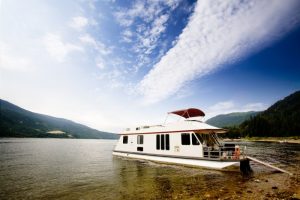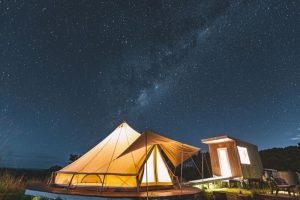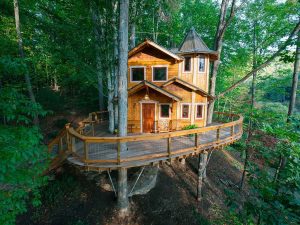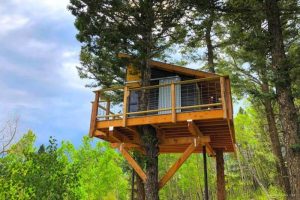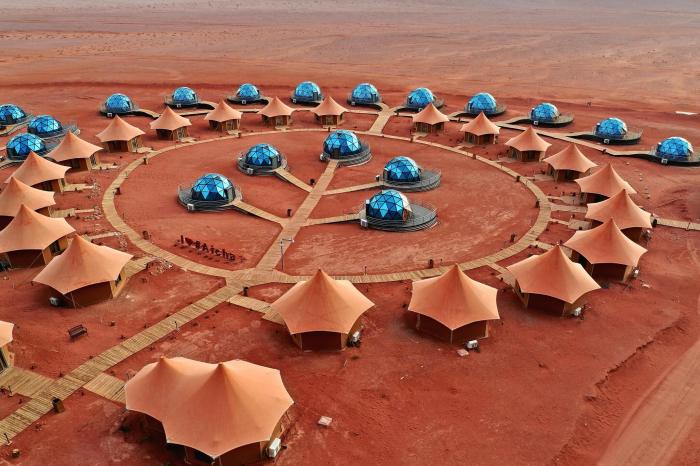
Unique hotel experiences offer a departure from the ordinary, transforming a simple overnight stay into a memorable adventure. From whimsical themed hotels to secluded eco-lodges and luxurious boutique accommodations, the possibilities are as diverse as the travelers themselves. This exploration delves into the various facets of crafting and enjoying these distinctive hospitality offerings, examining the key elements that elevate a hotel stay beyond the expected.
We’ll examine diverse hotel types, from treehouses nestled in forests to underwater havens, and discuss the marketing strategies and exceptional guest service that define these unique experiences. We’ll also consider how these unique stays integrate into broader travel plans, offering insights into cost-effective travel options and maximizing the overall travel experience.
Defining “Unique Hotel Experiences”

A unique hotel experience transcends the typical accommodation offering; it’s about creating lasting memories and providing a stay that’s significantly more memorable and personalized than a standard hotel visit. It’s about exceeding expectations and offering something truly special and tailored to the guest’s preferences and desires. This involves far more than just a comfortable bed and clean room.The key elements contributing to a unique hotel experience are multifaceted.
They encompass the overall ambiance and design, the level of personalized service, the provision of exceptional amenities, and the creation of immersive and memorable experiences tailored to the specific location and target audience. This could involve curated activities, unique dining options, access to exclusive services, and a design aesthetic that resonates with the guest’s values or aspirations. The goal is to create an unforgettable journey, not just a place to sleep.
Categories of Unique Hotel Experiences
Unique hotel experiences are diverse and span several categories, each offering a distinct appeal. These categories aren’t mutually exclusive; a single hotel might blend elements from multiple types.
- Themed Hotels: These hotels immerse guests in a specific theme, whether it’s a historical period (e.g., a Victorian-era hotel), a fictional world (e.g., a hotel based on a fantasy novel), or a particular lifestyle (e.g., a Hollywood-glamour themed hotel). The design, décor, and even the staff’s uniforms reflect the chosen theme, creating a fully immersive experience. For example, a hotel themed around the roaring twenties might feature jazz music, flapper-style décor, and cocktails served in vintage glassware.
- Eco-Lodges: These hotels prioritize sustainability and minimize their environmental impact. They are often located in stunning natural settings, offering guests opportunities to connect with nature. Eco-lodges often incorporate sustainable building materials, utilize renewable energy sources, and implement waste reduction strategies. They might also offer activities like guided nature walks, bird watching tours, or opportunities to learn about local conservation efforts.
A prime example is a lodge built using locally sourced timber, powered by solar energy, and offering guided hikes through a nearby rainforest.
- Boutique Hotels: Characterized by their unique design, personalized service, and intimate atmosphere, boutique hotels often feature a smaller scale and a highly curated experience. They frequently focus on local culture and artistry, incorporating locally sourced materials and art into their design. Boutique hotels often offer a higher level of personalized service, with staff members who are knowledgeable about the local area and able to cater to guests’ individual needs.
Imagine a boutique hotel in a historic city center, featuring locally crafted furniture, original artwork from local artists, and a concierge who can arrange private tours and bespoke experiences.
Types of Unique Hotel Stays
Choosing a unique hotel experience goes beyond simply finding a place to sleep; it’s about immersing yourself in a memorable and distinctive environment. This section explores several types of unique hotel stays, highlighting their characteristics and appeal. The options range from adventurous escapes to luxurious retreats, offering diverse experiences for every traveler.
Comparison of Unique Hotel Experiences
The following table compares four distinct types of unique hotel experiences, allowing for a clear understanding of their differences and similarities.
| Hotel Type | Setting | Amenities | Price Range |
|---|---|---|---|
| Treehouse Hotels | Forest or woodland areas | Elevated platforms, natural surroundings, basic to luxurious amenities depending on the property. Often includes stunning views. | Mid-range to luxury |
| Glamping Resorts | Varied – deserts, mountains, beaches | Luxurious tents or yurts, comfortable beds, private bathrooms, often include access to resort amenities such as pools and spas. | Mid-range to luxury |
| Underwater Hotels | Ocean | Rooms with panoramic underwater views, specialized diving and snorkeling opportunities, high-end amenities, often located in exotic locations. | Luxury |
| Castle Hotels | Historic castles or chateaux | Historically significant architecture, opulent interiors, often include fine dining, historical tours, and spa services. | Luxury |
Architectural Styles and Amenities of Unique Hotels
Three distinct types of unique hotels showcase diverse architectural styles and amenities:
Treehouse Hotels: Imagine a cluster of charming treehouses nestled amongst towering trees. The architecture is organic and blends seamlessly with the natural surroundings. Each treehouse might be individually designed, utilizing natural materials like wood and stone. Amenities could range from basic, rustic interiors to luxurious spaces with private balconies offering breathtaking views of the forest canopy below. Some may include access to nearby hiking trails or other outdoor activities.
Glamping Resorts: Glamping resorts offer a blend of luxury and the outdoors. Imagine spacious, elegantly appointed yurts or safari tents with comfortable furnishings, en-suite bathrooms, and perhaps even private decks. The architectural style emphasizes comfort and natural light, often incorporating elements of the surrounding landscape. Amenities might include shared facilities like pools, restaurants, and spas, offering a comfortable yet adventurous experience.
Underwater Hotels: Picture a futuristic, cylindrical structure submerged beneath the waves. The architecture is innovative and technologically advanced, designed to withstand underwater pressure and provide stunning panoramic views of the ocean. Rooms are typically spacious and elegantly appointed with large windows offering breathtaking views of marine life. Amenities would include high-end dining, spa services, and access to various water sports activities such as diving and snorkeling.
Unique Hotel Experiences Based on Location
Five unique hotel experiences, categorized by location, offer diverse settings and unforgettable stays.
These locations highlight the diverse possibilities available for unique hotel experiences, catering to various preferences and interests.
- Desert Oasis Resort: Imagine a luxurious resort nestled amidst rolling sand dunes, offering stunning sunsets and stargazing opportunities. Amenities could include private pools, spa treatments, and opportunities for desert adventures.
- Mountain Lodge: A cozy lodge nestled high in the mountains, surrounded by breathtaking views of snow-capped peaks and lush forests. Amenities might include fireplaces, comfortable rooms, and access to hiking trails and skiing opportunities.
- Jungle Retreat: A secluded retreat deep within a lush rainforest, offering a chance to experience the wonders of nature. Amenities could include open-air showers, private balconies overlooking the jungle, and guided nature walks.
- Arctic Ice Hotel: A unique hotel built entirely of ice and snow, offering a truly unforgettable winter experience. Amenities might include ice sculptures, warm clothing, and opportunities for viewing the Northern Lights.
- Island Paradise Resort: A luxurious resort situated on a pristine island, offering white sand beaches, crystal-clear waters, and opportunities for water sports. Amenities might include overwater bungalows, private pools, and fine dining.
Marketing and Branding Unique Hotel Experiences

Successfully marketing unique hotel experiences requires a nuanced approach that goes beyond traditional hospitality advertising. It necessitates understanding the specific desires and expectations of a discerning clientele seeking something beyond the ordinary. This involves crafting a compelling brand narrative and employing targeted marketing strategies to reach the right audience.Effective marketing hinges on showcasing the unique selling propositions (USPs) that set a hotel apart.
These USPs are not merely amenities; they are the essence of the experience, the curated moments that create lasting memories. By highlighting these unique aspects, hotels can attract guests who value authenticity and personalized service over generic offerings.
Strategies for Marketing Unique Hotel Experiences
Successful marketing involves a multi-pronged strategy. A holistic approach, incorporating digital marketing, public relations, and strategic partnerships, is crucial for maximizing reach and impact.
- Targeted Digital Marketing: Utilize social media platforms like Instagram and Pinterest to showcase visually stunning imagery and videos highlighting the hotel’s unique features and atmosphere. Run targeted advertising campaigns on platforms like Google Ads and Facebook, focusing on demographics and interests aligned with the hotel’s target audience (e.g., adventure travelers, luxury seekers, wellness enthusiasts).
- Public Relations and Influencer Marketing: Collaborate with travel bloggers, influencers, and journalists to generate positive media coverage and reviews. Press releases announcing unique events or partnerships can create buzz and build anticipation.
- Strategic Partnerships: Partner with complementary businesses, such as local tour operators, spas, or restaurants, to offer bundled packages and enhance the overall guest experience. This cross-promotion can expand reach and appeal to a wider audience.
- Email Marketing: Build an email list and nurture relationships with past guests and potential clients. Send personalized emails showcasing new offerings, special promotions, and exclusive content.
The Importance of Storytelling in Promoting Unique Hotel Experiences
Storytelling is paramount in connecting with potential guests on an emotional level. It’s about crafting a narrative that transcends the purely functional aspects of the hotel and instead conveys the essence of the experience. This involves highlighting the hotel’s history, its unique location, the inspiration behind its design, and the stories of the people who contribute to its unique character.A compelling narrative can evoke a sense of place, create anticipation, and inspire a desire to experience the hotel firsthand.
For instance, a hotel nestled in a remote mountain range might tell a story about its connection to nature, its sustainable practices, and the breathtaking views it offers. A boutique hotel in a historic city might weave a narrative around its architectural heritage, its connection to local artists, and its role in the city’s cultural scene.
Sample Marketing Campaign: Glamping Under the Stars
This campaign focuses on a glamping resort offering luxurious tents with stunning views of a national park. Slogan: “Unplug and reconnect with nature. Luxury redefined under the stars.” Visuals: High-quality photographs and videos showcasing the elegant tents, the breathtaking landscape, and guests enjoying activities like stargazing, hiking, and gourmet meals under the open sky. The imagery emphasizes a balance of luxury and nature, conveying a sense of serenity and adventure.
Marketing Channels: Instagram and Pinterest for visual storytelling; targeted Facebook and Google Ads campaigns focusing on adventure travelers and nature enthusiasts; collaborations with travel bloggers specializing in outdoor adventures; email marketing to past guests and subscribers.
Guest Experience and Service
Exceptional guest service is the cornerstone of a successful unique hotel experience. It’s not merely about fulfilling basic needs; it’s about exceeding expectations and creating lasting memories that solidify the hotel’s unique brand identity. A flawlessly executed guest experience transforms a simple stay into a memorable and highly-rated adventure, directly impacting online reviews and word-of-mouth marketing.The perception of uniqueness is amplified when guests feel genuinely valued and cared for.
This goes beyond providing comfortable rooms and amenities; it involves anticipating needs, personalizing interactions, and resolving issues swiftly and efficiently. A positive guest experience directly translates to increased guest loyalty, positive online reviews, and ultimately, greater profitability.
Personalized Service Creates Memorable Stays
Personalized service is paramount for unique hotels. It’s about recognizing that each guest is an individual with specific needs and preferences. This could involve remembering a guest’s name and previous requests, anticipating their needs based on their travel history (if shared), or proactively offering assistance based on observed behaviors. For example, a hotel specializing in adventure tourism might proactively offer maps and recommendations for local hiking trails, based on a guest’s expressed interest in outdoor activities during check-in.
Such personalized touches create a sense of genuine care and attention to detail, making guests feel valued and understood. This level of personalization strengthens the unique identity of the hotel, differentiating it from generic hotel chains.
Proactive Problem Solving and Anticipation
Unique hotels often offer unconventional or complex services. This necessitates a proactive approach to problem-solving and anticipation. Instead of simply reacting to guest complaints, proactive service involves anticipating potential issues and addressing them before they arise. Consider a boutique hotel situated in a remote location: proactive service might include providing detailed directions and transportation options, offering pre-arrival concierge services to arrange activities or transportation, or even packing a welcome kit with essentials like insect repellent or sunscreen.
This demonstrates a level of forethought and care that significantly enhances the guest experience and minimizes potential frustrations. A proactive approach builds trust and strengthens the perception of a well-managed and attentive establishment.
Leveraging Technology for Enhanced Guest Experience
Technology can significantly enhance the guest experience in unique hotels. A well-designed mobile app, for instance, can provide guests with a seamless check-in/check-out experience, personalized recommendations for local attractions and activities, real-time communication with hotel staff, and access to hotel services such as room service or spa bookings. Furthermore, smart room technology, such as voice-activated controls for lighting and temperature, can enhance guest comfort and convenience.
Finally, integrating a robust online review and feedback system allows the hotel to proactively address any issues and continuously improve its services based on direct guest input. These technological advancements streamline operations, personalize the guest experience, and foster a sense of modern sophistication. The seamless integration of technology should always complement the hotel’s unique brand identity, not overshadow it.
Unique Hotel Experiences and Related Travel Options
Unique hotel experiences offer a distinct alternative to traditional travel accommodations, providing curated and immersive stays that go beyond simply providing a place to sleep. They often blend luxury, adventure, and cultural immersion in ways that standard hotels or other options cannot replicate. This section will explore how these unique experiences compare to other travel choices and how they can be integrated into various travel plans.Unique hotel experiences stand apart from other accommodation types in their focus on creating a memorable and themed stay.
While vacation rentals offer self-sufficiency and space, they typically lack the curated services and experiences found in unique hotels. Cruises, on the other hand, provide all-inclusive packages but can feel restrictive in terms of itinerary and individual exploration. Unique hotels occupy a middle ground, offering personalized service and curated experiences while still allowing for flexibility and exploration beyond the hotel’s walls.
Comparison of Unique Hotel Experiences with Other Travel Accommodations
Unique hotels differentiate themselves through their immersive themes and curated experiences. A stay at a treetop hotel, for instance, provides a completely different atmosphere and activity set than a vacation rental in a city apartment or a cruise ship cabin. The level of personalized service, often including concierge-style assistance and bespoke activities, also distinguishes unique hotels. Vacation rentals prioritize self-catering and independent exploration, while cruises offer structured itineraries and all-inclusive packages.
The choice depends entirely on the traveler’s priorities: self-sufficiency, structured entertainment, or a curated, immersive experience.
Incorporating Unique Hotel Experiences into Travel Itineraries
Unique hotel stays can seamlessly integrate into diverse travel itineraries, enhancing the overall experience. A road trip across the American Southwest could include an overnight stay in a unique desert resort offering stargazing experiences and guided nature walks. A train journey through Europe might incorporate a stay in a historic castle hotel, offering a glimpse into the region’s history and culture.
The unique hotel becomes a central element, a highlight that enhances the narrative of the trip, rather than just a place to rest.
Sample Itinerary: Combining Unique Hotel Stay with Other Travel Options
This itinerary showcases a blend of unique hotel experience, train travel, and cultural exploration.
Day 1: Arrive at London Heathrow Airport (LHR). Transfer via Heathrow Express train to Paddington Station. Check in to The Zetter Townhouse Marylebone, a uniquely themed boutique hotel known for its quirky design and luxurious amenities. Explore the charming Marylebone neighborhood.
Day 2: Take a day trip to Oxford by train, visiting the historic university colleges and exploring the city’s rich history. Enjoy a traditional pub lunch before returning to London in the evening.
Day 3: Explore London’s iconic landmarks, including Buckingham Palace, the Tower of London, and the Houses of Parliament. Enjoy a final evening at The Zetter Townhouse, perhaps taking advantage of its unique bar experience.
Day 4: Depart from London Heathrow Airport (LHR).
This itinerary demonstrates how a unique hotel stay can be the focal point of a short trip, providing a luxurious and memorable experience that complements other travel activities. The choice of hotel, with its distinctive character, adds a unique layer to the overall travel experience, creating lasting memories beyond simply visiting the chosen destinations.
Flight Deals, Train Travel, Cruises, and More
Extending the unique hotel experience often requires exploring diverse and cost-effective travel options. This section delves into strategies for securing affordable flights, planning efficient train journeys, comparing cruise lines, designing a memorable road trip, and finding budget-friendly accommodations. We also examine the advantages and disadvantages of various travel choices, including vacation rentals and unique stay options like treehouses and houseboats.
Affordable Flight Deal Strategies
Finding cheap flights requires proactive searching and a bit of flexibility. Here are five effective strategies:
- Be flexible with your travel dates: Mid-week flights and traveling during the off-season often yield significantly lower fares. Consider flying on Tuesdays or Wednesdays instead of weekends.
- Use flight comparison websites: Sites like Google Flights, Skyscanner, and Kayak allow you to compare prices across multiple airlines and travel agencies.
- Set up price alerts: Many flight comparison websites offer price alerts, notifying you when prices for your chosen route drop.
- Consider budget airlines: Budget airlines often offer lower fares, but be aware of potential extra fees for baggage and other services.
- Book in advance or at the last minute: While booking in advance is generally recommended, sometimes last-minute deals can be surprisingly affordable, especially if you are flexible with your destination.
Cost-Effective Train Travel Planning
Train travel offers a relaxing and scenic alternative to flying, particularly for shorter to medium distances. Effective planning is key to maximizing your experience while minimizing costs.
- Book in advance: Early booking often secures the best fares, especially for popular routes.
- Consider off-peak travel: Traveling during off-peak hours or days can result in lower fares.
- Utilize rail passes: For extensive train travel within a specific region, rail passes can offer significant savings.
- Pack snacks and drinks: Avoid overpriced train station refreshments by bringing your own.
- Choose your seating strategically: Select seats offering the best views or proximity to amenities, depending on your preferences.
Cruise Line Comparison: Royal Caribbean, Carnival, and Disney
Royal Caribbean, Carnival, and Disney Cruise Line represent different segments of the cruise market. Royal Caribbean often features larger ships with extensive amenities and a wide range of activities. Carnival targets a more budget-conscious traveler with a focus on fun and party atmosphere. Disney Cruise Line caters to families with themed experiences and character interactions. Price points vary considerably, with Carnival generally being the most affordable and Disney the most expensive.
Pacific Coast Highway Road Trip Itinerary (California)
This itinerary focuses on a 7-day road trip along California’s iconic Pacific Coast Highway. Budget considerations include gas, accommodation (mix of budget hotels and motels), food (combination of restaurant meals and self-catering), and entrance fees to attractions.
- Day 1-2: Los Angeles to Santa Barbara: Explore Hollywood, visit Santa Monica Pier, and enjoy the beaches of Santa Barbara.
- Day 3-4: Big Sur: Drive along the breathtaking Big Sur coastline, hike to scenic viewpoints, and stay in a charming coastal motel.
- Day 5-6: Monterey & Carmel: Visit the Monterey Bay Aquarium, explore the charming town of Carmel-by-the-Sea, and enjoy the 17-Mile Drive.
- Day 7: San Francisco: Explore San Francisco’s iconic landmarks, such as the Golden Gate Bridge and Alcatraz Island.
Budget-Friendly Accommodation Tips
Finding affordable lodging is crucial for budget travelers.
- Consider hostels: Hostels offer a social and budget-friendly option, particularly for solo travelers or groups.
- Utilize hotel reward programs: Loyalty programs can offer discounts and free nights.
- Look for deals and packages: Websites and travel agencies often offer bundled deals that include accommodation and other services.
Vacation Rentals and Airbnbs: Advantages and Disadvantages
Vacation rentals offer more space and privacy than traditional hotels. However, they may lack the amenities and services of a hotel, and cleaning fees can add to the overall cost. Airbnb’s vast selection and variety of properties offer flexibility, but vetting the property and host is crucial.
Writing Helpful Hotel Reviews
Hotel reviews should be detailed, honest, and objective. Include specifics about the room, amenities, service, location, and value for money. Focus on both positive and negative aspects to provide a balanced perspective.
RV/Campervan Trip Checklist
Planning an RV or campervan trip requires careful preparation. Essential equipment includes camping gear, cooking supplies, navigation tools, and emergency supplies. Safety considerations include checking vehicle maintenance, planning routes, and being aware of weather conditions.
Unique Stays: Treehouses and Environmental Impact
Treehouses offer a unique and immersive experience, connecting guests with nature. However, their construction and maintenance can impact the surrounding environment, so choosing eco-friendly options is crucial. Sustainable materials and minimal impact construction are important considerations.
Houseboat vs. Yacht Stays
Houseboats offer a more relaxed and affordable option, ideal for exploring waterways at a slower pace. Yachts, on the other hand, provide a luxurious and faster mode of travel, suitable for exploring larger bodies of water. Houseboats generally offer more space for larger groups, while yachts are better suited for couples or smaller groups seeking a more opulent experience.
Ultimately, the pursuit of unique hotel experiences transcends mere accommodation; it’s about curating an unforgettable journey. By understanding the key elements – from innovative design and exceptional service to effective marketing and seamless integration into broader travel plans – hotels can create truly remarkable experiences for their guests. The diverse options available cater to a wide range of preferences, ensuring that every traveler can find a unique stay that resonates with their individual desires for adventure and relaxation.
Commonly Asked Questions
What is the average price range for unique hotel experiences?
The price varies dramatically depending on location, type of hotel (e.g., treehouse vs. luxury resort), and amenities offered. Expect a wider range than standard hotels, from budget-friendly options to extremely luxurious experiences.
How far in advance should I book a unique hotel?
Due to limited availability, booking well in advance (3-6 months or more) is highly recommended, especially for popular destinations and unique hotel types during peak season.
Are unique hotels suitable for families with children?
This depends entirely on the specific hotel and its amenities. Some unique hotels are better suited for adults, while others actively cater to families with child-friendly facilities and activities.
What should I pack for a unique hotel stay?
Packing needs vary based on the hotel’s location and activities. Consider the climate, potential outdoor activities, and any specific requirements mentioned by the hotel (e.g., hiking boots for a mountain lodge).
